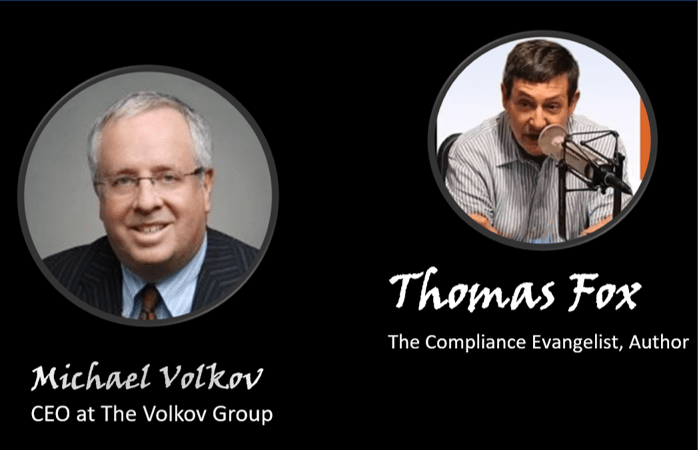Countdown to 500 – Michael Volkov on the Evolution of FCPA Enforcement
By Thomas Fox ,The Compliance Evangelist, Author
We are on the final countdown to Number 500. Today on the FCPA Compliance Report, I post Episode 495, which is an interview with Mr. Michael Volkovv,CEO at The Volkov Group. Mike and I take a look back at Foreign Corrupt Practices Act (FCPA) enforcement over the past 10 years or so.
Volkov begins this most celebratory week as he and I look back at FCPA enforcement over the past 10 years. We begin by recalling how, in the early part of the decade, we were both still trying to read the tea leaves and decipher where the Department of Justice (DOJ) and Securities and Exchange Commission (SEC) might be headed by trying to interpret the various Deferred Prosecution Agreements (DPAs), Non-Prosecution Agreements (NPAs) and other enforcement actions. Specifically, we would all look for trends in Schedule C, which listed the compliance program requirements. Volkov pointed to the Pfizer enforcement action of 2012 as an example, where the DPA listed out an auditing program for third parties.
However, this largely ended with the 2012 original version of the FCPA Resource Guide, which was the best single reference tool for all things FCPA. It listed case law, the statute itself, DOJ and SEC interpretations, formulated the original 10 Hallmarks of an Effective Compliance Program and laid out both hypotheticals and, most notably, declinations. Clearly the government was responded to commentary and OECD. It was the most welcomed resource from the DOJ and SEC on all things FCPA and has been the standard text since that time. Indeed, it still sits in the offices of most compliance professionals to this day. It has now been updated with the 2nd edition, and it still remains the essential resource guide for all things FCPA.
Volkov, one seriously immune from hyperbole, said of the FCPA Resource Guide,
“the FCPA Resource Guide was perhaps incredible. And I’ve told Chuck Duross, and others in the Fraud Section and the FCPA Unit that that it was perhaps one of the most single most influential pieces of work in compliance. I mean, to me it’s bigger than the sentencing guidelines, if you think about it.”
Evolution in DOJ Thinking around Incentives to Self-disclose.
Another area we considered was the evolution in DOJ thinking around incentives to self-disclose. Interestingly, Volkov went far back into the recesses of the FCPA to the Father of the FCPA, Stanley Sporkin, who back in the late 1970s in his heyday of SEC enforcement, was the one who started saying
“if companies come in and confess and fix the problem and I’ll leave it open, you guys all come in and he got a great response from companies. He created an enforcement program, which is basically close to the presumption that we see now in the corporate enforcement program. But you have to come in, be truthful, tell me everything you did, tell us and how you fixed the problem and obviously cooperate.”
DOJ has become aggressive enforcement program with the FCPA Corporate Enforcement Policy
Now the DOJ has come “full circle from sort of an aggressive enforcement program with the FCPA Corporate Enforcement Policy” and the presumption of a declination.
From my perspective, it seemed to start with two 2014 FCPA enforcement actions, which are now recognized as early precursors of the FCPA Corporate Enforcement Policy. They are the Hewlett-Packard (HP) and, perhaps even more significantly, Parker Drilling.
In Parker Drilling, there was C-suite involvement in the bribery scheme. Yet even with C-suite involvement, the company obtained a significant discount off the low end of the Sentencing Guidelines. And at the time many of us scratched our head because we could not understand how there could C-suite involvement yet a fine and penalty below the minimum Sentencing Guideline range.
In HP, we had multiple bribery schemes literally across the globe. What we were not aware of at the time, was that both entities massive amounts of credit for extraordinary cooperation.
Volkov also had the insight that because of the work by Dan Chapman at Parker Drilling, who put in gold standard compliance program during the pendency of the investigation, he was able to garner an even greater discount for Parker Drilling.
Volkov also believes, “Chapman deserves a lot of credit in terms of educating the DOJ on this and showing what a company could do.” Volkov sees a straight line from Parker Drilling to Cognizant Technology in 2019 where there was also C-Suite involvement.
I hope you will listen to the full podcast to hear about these issues and many more from Volkov.
- Core Investigative Due Diligence - June 3, 2021
- Preparing for the Next Crisis - May 14, 2021
- Using Data in Compliance - March 29, 2021


Stay connected